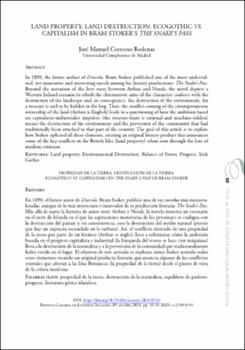Land Property, Land Destruction: Ecogothic vs. Capitalism in Bram Stoker’s The Snake Pass
Fecha
2024Resumen
In 1890, the future author of Dracula, Bram Stoker, published one of the most underval-
ued, yet innovative and interesting novels among his literary productions: The Snake’s Pass.
Beyond the narration of the love story between Arthur and Norah, the novel depicts a
Western Ireland scenario in which the chrematistic aims of the characters coalesce with the
destruction of the landscape and, in consequence, the destruction of the environment, for
a treasure is said to be hidden in the bog. Thus, the conflict coming of the extemporaneous
ownership of the land (Arthur is English) leads to a questioning of how the ambition based
on capitalistic-industrialist impulses (the treasure-hunt is rational and machine-ridden)
means the destruction of the environment and the perversion of the community that had
traditionally been attached to that part of the country. The goal of this article is to explore
how Stoker ciphered all these elements, creating an original literary product that announces
some of the key conflicts in the British Isles (land property) when seen through the lens of
modern criticism. En 1890, el futuro autor de Dracula, Bram Stoker, publicó una de sus novelas más minusva-
loradas, aunque de lo más interesante e innovador de su producción literaria: The Snake’s Pass.
Más allá de narra la historia de amor entre Arthur y Norah, la novela muestra un escenario
en el oeste de Irlanda en el que las aspiraciones monetarias de los personajes se coaligan con
la destrucción del paisaje y, en consecuencia, con la destrucción del medio natural (puesto
que hay un supuesto escondido en la turbera). Así, el conflicto derivado de una propiedad
de la tierra por parte de un foráneo (Arthur es inglés) lleva a reflexionar cómo la ambición
basada en el progreso capitalista e industrial (la búsqueda del tesoro se hace con máquinas)
lleva a la destrucción de la naturaleza y a la perversión de la comunidad que tradicionalmente
había vivido en el lugar. El objetivo de este artículo es explorar cómo Stoker acrisoló todos
estos elementos creando un original producto literario que anuncia algunos de los conflictos
centrales que afectan a las Islas Británicas (la propiedad de la tierra) desde el punto de vista
de la crítica moderna.





